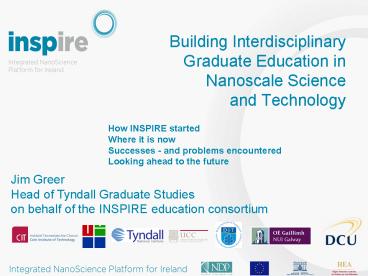Building Interdisciplinary Graduate Education in Nanoscale Science and Technology - PowerPoint PPT Presentation
1 / 14
Title:
Building Interdisciplinary Graduate Education in Nanoscale Science and Technology
Description:
hands on research with state-of-the-art equipment ... Nanoscale science and engineering requires a. of training due to convergence in the fields of: ... – PowerPoint PPT presentation
Number of Views:61
Avg rating:3.0/5.0
Title: Building Interdisciplinary Graduate Education in Nanoscale Science and Technology
1
Building Interdisciplinary Graduate Education
inNanoscale Science and Technology
How INSPIRE started Where it is now Successes -
and problems encountered Looking ahead to the
future
Jim GreerHead of Tyndall Graduate Studieson
behalf of the INSPIRE education consortium
2
A decade of infrastructural investment in
nanoscale science and engineering
INSPIRE Graduate Education is a PRTLI 5 proposal
to build on this investment- aligned with the
Irish 4th level institutions strategies for the
integration of research and teaching
Competence Centre for Applied Nanotechnology
3
Integrated Nanoscience Platform for Ireland
and INSPIRE continues to exchange modules
with TCD and UCD
4
Bringing in industry and an international
component
UU
DIT DCU
NUI Galway
UL
CIT Tyndall/UCC
5
Genesis model of PhD education
- In the day when God created man,
- He made him in the likeness of God.
- Genesis 51
6
can be an extremely successful approach
supervisor
Julian Schwinger Nobel Prize in Physics, 1965
4 PhD students later to be Nobel laureates
Benjamin Roy Mottelson Nobel Prize in Physics,
1975
Walter Kohn Nobel Prize in Chemistry, 1998
Sheldon Glashow Nobel Prize in Physics, 1979
Roy Glauber Nobel Prize in Physics, 2005
7
but there are other paths
Paul Dirac Nobel Prize in Physics, 1933 Trained
as electrical engineer and physicist
Linus Pauling Nobel Prize in Chemistry
1954 Trained as chemical engineer, physical
chemist and mathematical physicist-
contributions to chemistry, biology and physics
Gordon Moore Co-founder of Intel Corp. Trained as
chemist and physicist (minor)
John Bardeen Nobel Prize in Physics, 1956,
1972 Trained as electrical engineer and physicist
8
Interdisciplinary its not either or
9
Where are we now?
FREE
www.nanograd.ie
Archive
10
Minimum requirements
INSPIRE Nanotechnology and Nanoscience
Foundation Module
Graduate Course in Nanoscience (1 week intensive
course)
1 module 5 ECTS
Theme Specific Option Modules
Nanobioscience Molecular Cellular
Biology Lab-on-a-chip Technologies Nanobiomaterial
s
Electronics Nanoelectronics NanoFabrication Micros
ystems
Photonics Photonic Devices Photonic
Systems Photonic Materials
3 modules 15 ECTS (minimum)
Theory Simulation Electronic Structure
Theory Statistical Mechanics
Programming Concepts
Experimental Methods Nanosynthesis Assembly
Nanoscale Characterisation Spectroscopy Imaging
Special Topic Modules INSPIRE nanoscience/technol
ogy special topics modules or relevant
discipline specific modules from partner graduate
schools
2 modules 10 ECTS (minimum)
Generic and Transferable Skills Modules
Project Management Outreach Entrepreneurship
Writing and Presentation Information
Literacy Teaching Learning
Placements
Supervision and Planning
2 modules 10 ECTS
Industry, International HEI, or INSPIRE
placements
PhD Progress Reporting Personal Development Plan
11
Inspire Structured PhD Benefit to student
Access to Inspire Partners facilities
PhD Submission Examination
Foundation module in Nanotechnology
Outreach
Special topic module
Placement Ind., internatl, Inspire site
Participation in conferences journal
publications
12
Benefits
- Students gain access to
- access to best scientific education available
from all of Ireland, in association with
world-leading management school, with emphasis on
entrepreneurship training - hands on research with state-of-the-art
equipment - credited transferable and generic skills
training - exchange programme with leading US and UK
universities and Irish industry, well-matched
research allowing continuity during student
exchanges (list of exchange sites to grow) - 4th Level Ireland gains
- flexible curriculum responsive to Irish industry
requirements - graduates trained to solve technical, business
and societal challenges that will occur over
their lifetimes - an inclusive, flexible programme open to all
Irish 4th level graduate initiatives
13
Looking ahead to the future
- Logistics
- scheduling and coordination
- coherence and compatibility for module sharing
between - i) institutions ii) GREPs
- turn-key technical delivery and compatibility
- video conferencing/recording/web download
- Integration into academic programmes at each
partner site and inter-institutional credit
transfer. Quality control - Sustainability
- resource allocation models at each university
- between universities
14
INSPIRE addresses Irelands needs
- Nanoscale science and engineering requires a
- of training due to convergence in the fields of
- Physics Chemistry Life Sciences Engineering
spectrum
Ireland has more than 500 companies, both
multinational and indigenous, employing
approximately 130,000 people in the ICT, medical
devices and biopharmaceutical sectors. These
companies utilise nanotechnology for continued
product innovation and competitiveness. Of 150
billion in goods and services exported by Ireland
in 2008, it is estimated 10 were enabled by
nanoscience and related nanotechnologies. By
focusing on the area of nanotechnology there is
the potential to grow this figure to 20 allowing
Ireland to take a significant share of an
estimated global market of 3 trillion in
2015. Tánaiste Mary Coughlan (November, 2009)































